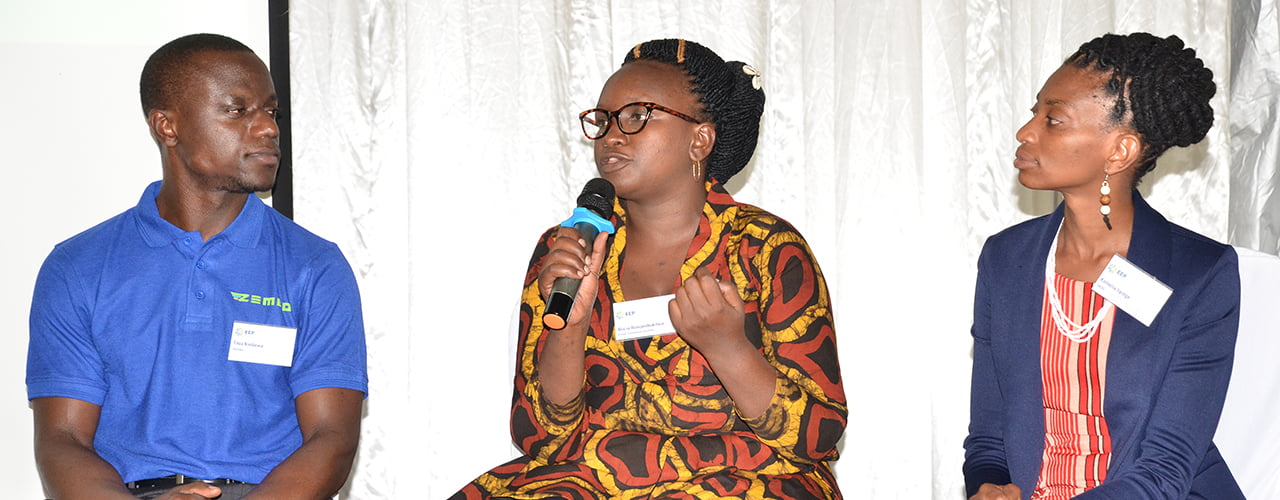
Focus on Climate Resilience and Productive Use at Knowledge Week
The EEP Africa Knowledge Week featured a series of events, publications and awards that highlighted the role of clean energy in climate adaptation and resilience, circular economy, and productive use.
On 17-19 November 2020, EEP Africa organized a series of virtual events to showcase innovative companies and lessons learned from our portfolio, as well as to launch two major publications. Close to 200 people joined the events to hear insights from project developers, investors, donors and consultants working in the clean energy sector in Africa.
The virtual conference marked the launch of two new knowledge products: Energising Resilience and 2020 Market Report. The week also celebrated EEP Africa’s 10th anniversary and the winners of our 2020 awards for Project of the Year and Rising Energy Leader. (See the full list of events and speakers.)
The first session of Knowledge Week focused on Clean Energy for Climate Resilience (view recording). Renewable energy projects are often viewed in terms of climate mitigation, but they are also producing important co-benefits for climate adaptation and resilience. A panel of experts discussed the findings from the new EEP Africa study Energising Resilience: Climate Co-benefits from Clean Energy Projects, in particular the role of clean energy in fostering agricultural resilience and local self-reliance.
The panelists agreed with the study’s conclusions that clean energy developers need to take a value chain approach and carefully consider the local context. At the same time, financiers need a more holistic approach to climate funding and impact evaluation. Dr. Rebekah Shirley of Power for All commented that,
There is a need to get out of the silos of energy, agriculture and climate and really begin collaborating around the solutions. Investors are in the perfect place to incentivize companies, NGOs and local government to better understand linkages and put more data into the space about actual impact, which will help develop better models.
The next session looked at practical lessons from the field in the area of Expanding Productive Use: Lessons from the Field (view recording). EEP Africa’s recent call for proposals demonstrated the wide range of innovative approaches to productive use of energy, ranging from egg incubators to industrial-sized mills and a high number of solar irrigation and cold storage solutions, as well as clean energy solutions for a circular economy.
The new EEP Africa 2020 Market Report: Productivity and Circularity in the Clean Energy Sector looked at data from the call and from our active portfolio to examine market developments in these areas, as well as the impact of COVID-19 on early-stage companies.
In this webinar, leaders of projects highlighted in the report discussed their experience bringing sustainable and climate resilient productive use solutions to the market in Africa. The Several speakers noted the need to provide on-going support services to customers alongside the technology in order to maximize the use of and benefit from appliances. This support may include technical and business training, affordable financing schemes, and linking farmers to markets.
The final session of the week looked backwards and forwards while presenting the EEP Africa Awards (view recording). Since EEP Africa was launched by the governments of Finland and Austria in 2010, programs to mitigate climate change and foster climate adaptation and resilience have only increased in importance.
The Finnish Ambassador for Climate Change, Jan Wahlberg, offered praise to all the entrepreneurs and project developers implementing projects, especially during this difficult year, and emphasized that,
EEP Africa has had a significant impact by increasing access to sustainable energy, especially for last-mile customers, while achieving several climate and other co-benefits, including job creation, income generation, and women’s entrepreneurship to name a few.
This significant impact on the sector was highlighted in the 2020 Project of the Year award. From the five finalists, an international jury selected a grid-connected solar PV plant in Burundi by Gigawatt Global. EEP Africa provided financing for the feasibility study back in 2015 and the plant is now close to completion with a 25-year PPA that will increase installed capacity in the country by 15%.
Building on this decade of experience and impact, EEP Africa is looking towards the future with its new Rising Energy Leader award to recognize the next generation of innovators. The five award recipients for 2020 participated in a roundtable discussion on emerging trends and opportunities in the sector.
EEP Africa thanks all the speakers, companies, donors and partners involved in Knowledge Week 2020. We look forward to continued collaboration in the next decade of our operations!


